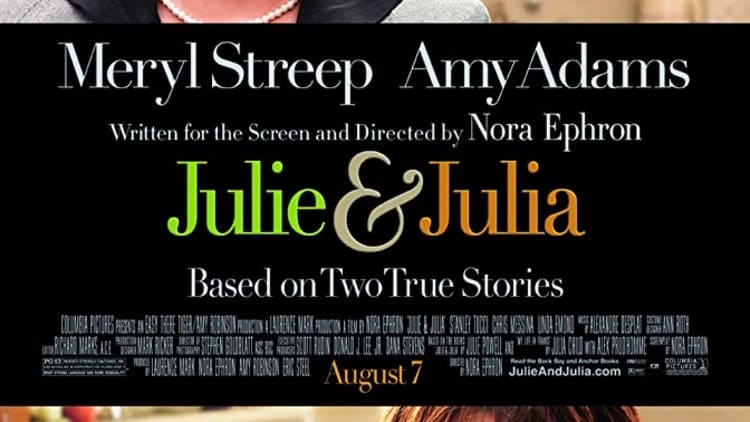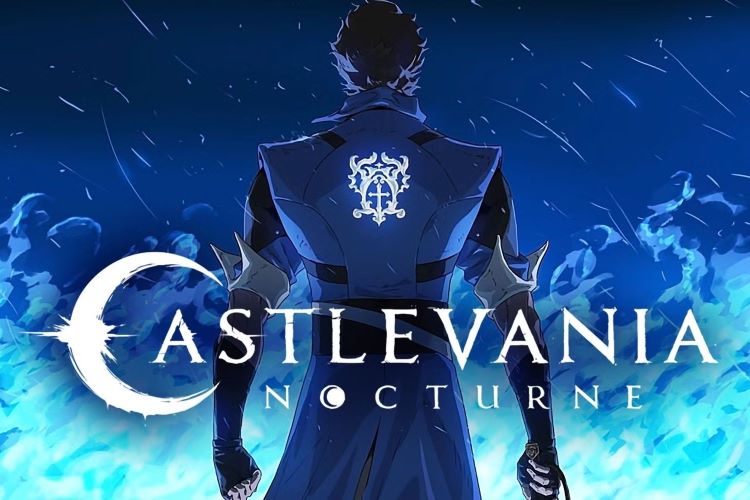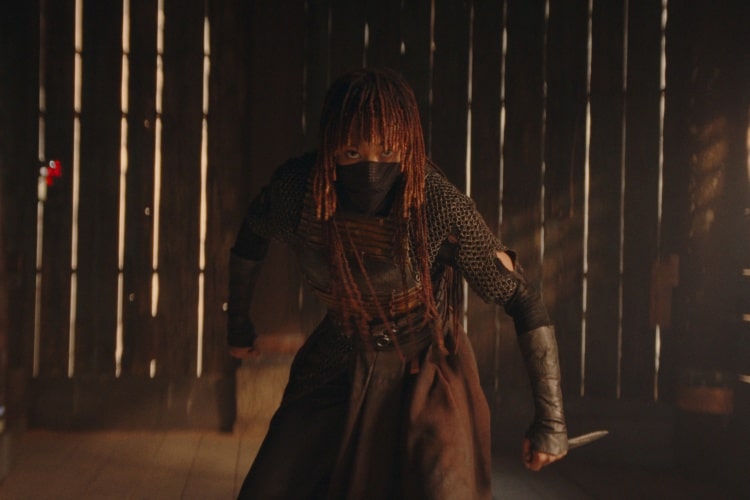I hate cooking but I love cooking shows. Well, not the regular ones – I like the competition ones because I’m just a little twisted that way. The regular ones bore me because they seem to think I might actually consider preparing one of their dishes. Silly them. The one exception has always been Julia Child. She was entertaining all on her own, whether cooking or eating the dishes made by others. Julie Powell loves her too, and it was that very love that provided the initial inspiration for the film Julie & Julia.
Julie & Julia is based on two memoirs, one about a New York woman searching for solace in the kitchen, the other an autobiography of Julia Child. Julie Powell wrote the first, after a hugely successful blog in which she chronicled her attempt to make every recipe in Child’s iconic cookbook Mastering the Art of French Cooking. The second was written (duh) by Child herself with the assistance of Alex Prud’homme and provides the details of Child’s adult life before she achieved international fame. The film hops back and forth between Julie (Amy Adams) and her struggles and joys with both cooking and her life in general and Julia (Meryl Streep) and her struggles and joys with cooking and writing and living as a larger than life woman.
Let’s get this out of the way first – Meryl Streep is brilliant. She captures the very essence of the Julia Child I used to watch on television. How true that is to the woman herself I will never know, but it is such a gloriously joy filled portrayal of Julia as the world knew her that I can only hope it is spot on. I’ve read some interesting things about how costuming helped make Streep look taller and proportioned more like Child, but that’s just the surface. Beneath the dresses and heels Streep makes Julia so vastly charming and full of joie de vivre that it feels like a privilege to watch her work. It’s an amazing performance worth every bit of praise and every award nomination it garners. Kudos also to Stanley Tucci for his portrayal of loving husband Paul Child. The recreation of mid-century Paris is great fun and at times very amusing, adding a strong sense of time and place to Julia’s portion of the story.
Now, on to the rest of the movie that unfortunately is not as perfect as Streep’s Julia Child. Not to say that it’s entirely bad – it isn’t. Both stories are entertaining, though in vastly different ways. I enjoy the real world struggles of Julie Powell as she seeks to escape her stress and feelings of inadequacy with a project that would leave me with a knife to my own throat. Misternocket doesn’t like Julie, he thinks she is whiney and unappealing. He isn’t the first to have that complaint. But for once, Adams doesn’t bother me and I find her to be rather sweet. I believe firmly that it’s because I do not cook. Her whining seems to me very mild in the face of her challenge – I would have whined and moaned until God himself told me to shut up if I had to cook even a fraction of those dishes. She seems pretty game to me. The devil isn’t in the details, it’s in the perspective.
But I do understand the criticism in comparison to Julia’s story. That Child was so positive and her obstacles much more daunting does make Julie look like a baby. And that’s my major issue with the movie – I don’t think the two stories fit together well at all. Director Nora Ephron wrote the screenplay and I think it’s flawed at a conceptual level that carries through to the execution. Child was an international icon. Powell is a regular woman. To try and push and pull one against the other just doesn’t quite work. Technically the transition from one story to another is often abrupt, blunt and without nuance or cinematic finesse, making the two stories even less compatible. We’re watching two different movies, taken from two different books written by two very different people and we never once forget that fact. We don’t like Julie because we constantly compare her to Julia. We love Julia even more because she is so much grander than the workaday Julie. It’s just all too uneven. The stories are loosely tied together conceptually when they meet, but never enough to make the transitions work.
Yet with all that said, I like both stories. Julia Child was marvelous in life and Streep does her proud. Julie Powell is marvelous in a different way and Adams gamely plays against the far more talented Streep much the way Powell pitted herself against the gargantuan culinary task of Child’s book. But I don’t like the stories forced together into one movie, it just doesn’t work either conceptually or technically. The transitions are jarring and the movie screeches to a halt every time we’re forced to leave one story for the other. Ephron would have been wiser to focus on one of these stories and let the other fall into subplot rather than try to give them equal time. Structurally Julie & Julia fails, though the charming stories (each on their own) are likely to give foodies, Julia Child fans or Meryl Streep devotees plenty to enjoy.

Sue reads a lot, writes a lot, edits a lot, and loves a good craft. She was deemed “too picky” to proofread her children’s school papers and wears this as a badge of honor. She is also proud of her aggressively average knitting skills She is the Editorial Director at Silver Beacon Marketing and an aspiring Crazy Cat Lady.





Leave a Reply